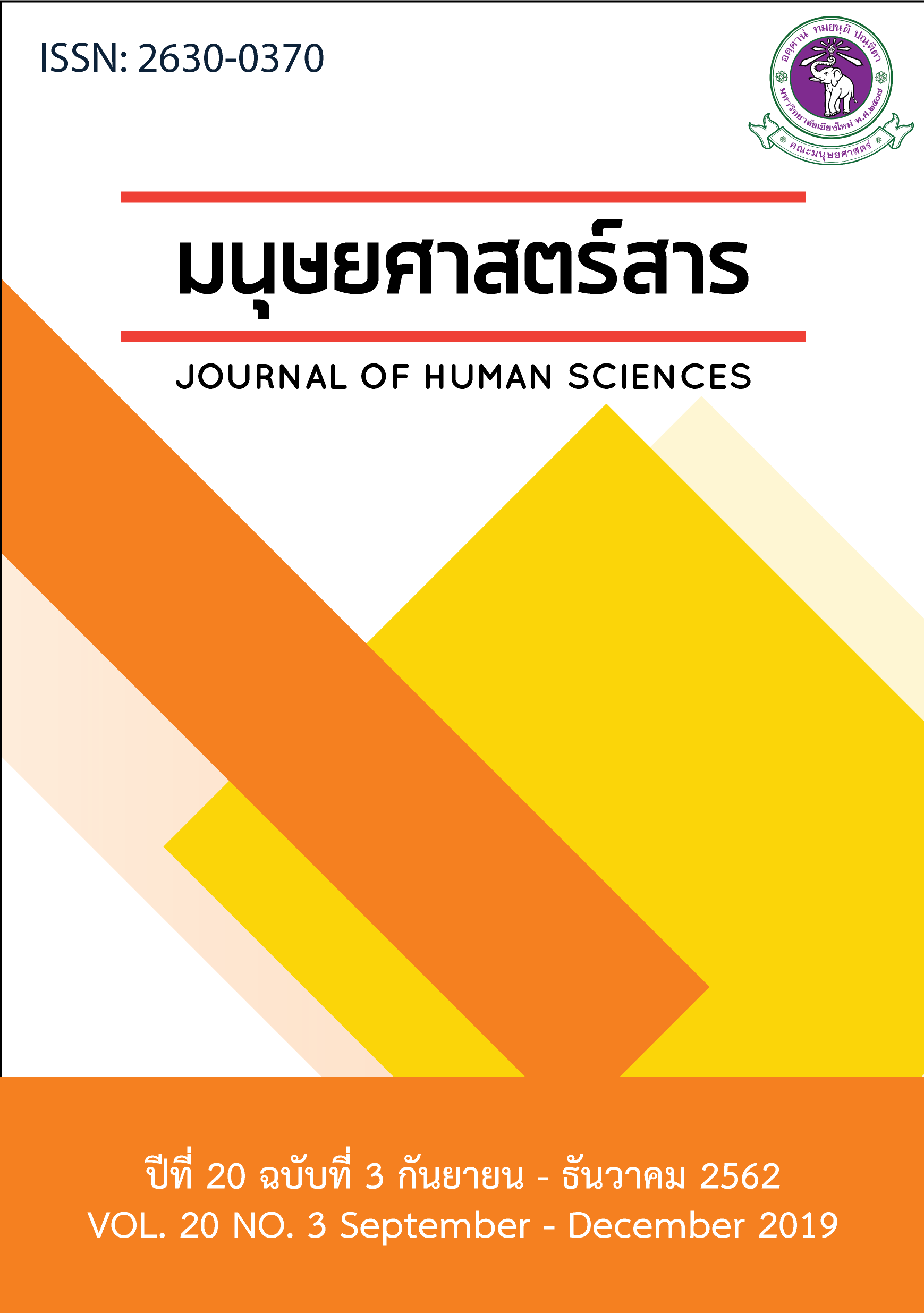ความสุขของผู้สูงวัย: ความหมายจากการงาน
Main Article Content
บทคัดย่อ
การวิจัยนี้มีวัตถุประสงค์เพื่อศึกษาการให้ความหมายของความสุขจากแก่นประสบการณ์ของผู้สูงวัยที่ยังคงรักในการทำงาน โดยใช้ระเบียบวิธีวิจัยเชิงคุณภาพ (Qualitative research) แบบปรากฎการณ์วิทยา (Phenomenology study) เก็บข้อมูลโดยการสัมภาษณ์เชิงลึกผู้สูงวัยที่ยังรักในการทำงาน 8 ท่าน การวิเคราะห์ข้อมูลเริ่มต้นวิเคราะห์ภายหลังจากการเก็บข้อมูลทุกครั้งโดยการวิเคราะห์ข้อมูลเชิงเนื้อหา ข้อมูลที่ได้จากการวิเคราะห์สะท้อนผลการวิจัยทำให้เห็นประเด็นหลัก 2 ประเด็น ได้แก่ ความเป็นมาของผู้สูงวัยที่ยังคงรักในการทำงาน และความหมายของความสุขจากการทำงาน ประเด็นแรก ความเป็นมาของผู้สูงวัยที่ยังรักในการทำงาน เป็นการบรรยายถึงชีวิตของผู้ให้ข้อมูลหลักแต่ละท่านในการดำเนินชีวิตและการทำงาน เป็นประสบการณ์ชีวิตของผู้ให้ข้อมูลหลักที่บ่มเพาะมาอย่างยาวนาน ส่วนประเด็นที่สอง ความหมายของความสุขจากการทำงานที่ได้กลั่นกรองจากประสบการณ์ของผู้สูงวัยทั้ง 8 ท่าน มี 6 ประเด็น ได้แก่ 1. ความสุขจากความภูมิใจ 2. สุขที่ได้ทำงานที่รักและถนัด 3. สุขจากการมีมิตรภาพที่ดีในที่ทำงาน 4. สุขที่มีโอกาสได้แบ่งปัน 5. ความสุขคือสนุกกับงานที่ทำ และ 6. สุขเพราะได้ทำงานไม่ได้อยู่เฉยๆ ความสุขของผู้สูงวัยคือการที่ยังคงทำงานอย่างมีความสุข เป็นความสุขจากคุณค่าของงานที่ทำและการรับรู้ว่าตนเองยังมีความหมายกับโลกใบนี้ บุตรหลานควรสนับสนุนให้ผู้สูงวัยได้ทำในสิ่งที่รัก และได้ใช้ศักยภาพของตนอย่างเหมาะสมกับวัย และควรขยายผลไปสู่ความเข้าใจของบุคคลทั่วไปในสังคมไทยถึงประเด็นความสุขของผู้สูงวัยที่มีใจรักในการงาน และเป็นแนวทางในการเตรียมความพร้อมในการก้าวเข้าสู่การสูงวัยอย่างมีความสุข
Article Details
เอกสารอ้างอิง
Altiner, S. (2015). Happiness. (Master of Religion Culture and Society thesis, University of Leiden). Retrieved from http://hdl.handle.net/1887/33869
Boontoch, K. (2017). khwamsuk khwamthuk læ sukphapchit khong phusung ayu nai chumchon hængnưng nai phaknưa to̜nbon Prathedthai [Happiness, Distress and Mental Health of the Elderly in a Community in the Upper North Region of Thailand]. Journal of the Psychiatric Association of Thailand, 62(3). 257-270.
Chueng, Y. N. & Chan, C. W. J. (2009). Intergeneration perception toward happiness in elderly life (APIAS Monograph Paper Series No.22).
Retrieved from http://commons.ln.edu.hk/apiasmp/22
Choorat, W., Sawangdee, Y., & Arunraksombat, S. (2012). Patchai thi mi ittipol to phawasiang kan mi panha sukphapchit khong phusung ayuthai [Factors Influencing the Risk of Having Mental Health Problems of Thai Elderly]. Thai population Journal, 3(2). 87-109.
Department of Older Person. (2017). Sathiti phusung ayu [Statistics on older population]. Retrieved from http://www.dop.go.th/th/know/1
Department of Older Person. (2017). Phraratchabanyat phusung ayu Songphan haroI sisip hok [The Thai Elderly 2003]. Retrieved from http://www.dop.go.th/th/laws/2/10/785 Diego, A. A., Cerna, L. C., &
Agdeppa, J. Y. (2018). Happiness Among Selected Filipino Elderly:
A Consensual Qualitative Research. Journal of Computational and Theoretical Nanoscience, 24(4). 2611-2615.
Diener, E. (2000). Subjective Well-Being: The Science of Happiness and Life Satisfaction, 63-74, In Snyder, C.R. & Lopez, S.J. (Eds.), The Handbook of Positive Psychology. Oxford University, New York: n.p.
Duckworth, A. L., Steen, T. A., & Seligman, M. E. P. (2005). Positive psychology in clinical practice. Annual Reviews of Clinical Psychology, 1(1), 629-651.
Erikson, E.H. (1982). The life cycle completed: A review. New York: Norton
The Foundation of Thai Gerontology Research and Development Institute. (2012). RaIngan prachampi Sathankan phusung ayuthai Phoso Songphanharo̜ihasipha [Annual Report on the Situation of the elderly in Thailand 2012]. Bangkok: Phongphanit charœnphon.
Frankl, E. V. (1959). Man’s search for meaning: an introduction to Logotherapy. New York: New American Library.
Isen, A. M. (1987). Positive affect, cognitive processes, and social behavior. In L. Berkowitz (Ed.), Advances in experimental social psychology, 20, 203-253. San Diego, CA, US: Academic Press. DOI: 10.1016/S0065-2601(08)60415-3.
Jantawanich, S. (2010). Withi kan wichai chœng khunnaphap [Qualitative Research Metho-dology]. Bangkok: Chulalongkorn University Press.
Kowal, P., & Dowd, J. E. (2001). Definition of an older person. Proposed working definition of an older person in Africa for the MDS Project. Geneva: World Health Organization.
Lyubomirsky, S., Sheldon, K. M., & Schkade, D. (2005). Pursuing happiness: The architecture of sustainable change. Review of General Psychology, 9(2), 111-131. DOI: 10.1037/1089-2680.9.2.111
Lyubomirsky, S., Dickerhoof, R., Boehm, J. K., & Sheldon, K. M. (2011). Becoming happier takes both a will and a proper way: An experimental longitudinal intervention to boost well-being. Emotion-APA, 11(2), 391-402.
Mauss, I. B., Savino, N. S., Anderson, C. L., Weisbuch, M., Tamir, M., & Laudenslager, M. L. (2011). The pursuit of happiness can be lonely. Emotion, 12(5). 908-912.
McMahon, D. M. (2006). Happiness: A History. New York: Atlantic Monthly Press.
Guaderrama, R. (2018). No questions please, Albert Camus. Retrieved from https://stoicanswers.com/2018/03/06/no-questions-please-albert-camus
National Statistical Office. (2017). Kan thamngan khong phusung ayu nai prathedthai [Works of the older population in Thailand]. Retrieved from http://www.dop.go.th/th/know/1/100024.
Office of the National Economic and Social Development Council. (2017). Phæn phatthana sētthakit læ sangkhom hængchat Chabapthi Sipsong (Phoso Songphanharo̜ihoksip-Songphan haroihoksipsi) [The twelfth national economic and social development plan 2017-2021] Retrieved from https://www.nesdb.go.th/nesdb_en/ewt_dl_link.php?nid=4345
Pattakos, A. (2010). Prisoners of our thoughts: Viktor Frankl’s principles for discovering meaning in life and work. San Francisco, CA: Berrett-Koehler.
Pattakos, A., & Dundon, E. (2017). Discovering Meaning through the Lens of Work. Journal of constructivist psychology, 30(1). 42-49.
Potts, J. (2011). The use of happiness in society. Policy, 27(1), 3-10.
Schooler, J. W., Ariely, D., & Loewenstein, G. (2003). The pursuit and assessment of happiness may be self-defeating. In J. Carrillo & I. Brocas (Eds.), The psychology of economic decisions. (pp. 41-70). Oxford, England: Oxford University Press.
Seligman, M. E. P. (2002). Authentic Happiness: Using the New Positive Psychology to Realise your Potential for Lasting Fulfilment. New York: Free Press.
Seligman, M. E. P. (2011). Flourish: A Visionary New Understanding of Happiness and Well- Being. New York: Free Press.
Thamon, P. (2011). khwamsuk nai chiwit khong phusung ayu nai chumchon mưang: Krani sưksa chumchon watchaithit Khet bangkoknoi Krungthepmahanakhon [Happiness of the Elderly in the Urban City: A Case Study at Wat chaitid Community Bangkok Metro- polis]. (Master of Social Work, Thammasat University).
Tsuladze, L., Chitashvili, M., Bendeliani, N., & Arutinovi, L. (2013). Concept of Happiness and Happiness in Georgia: Perceptions and Correlates of Reported Overall Happiness. Center for Social Sciences. Retrieved from http://css.ge/index.php?lang_id=ENG&sec_id=23&info_id=816
Tuicomepee, A., (2010). Chitbambat næo khwammaI nai chiwit [Logotherapy]. Bangkok: Chulalongkorn University.
Waldinger, R. (2015). What makes a good life? Lessons from the longest study on happiness. Retrieved from https://www.ted.com/talks/robert_waldinger_what_makes_a_good_life_lessons_from_the_longest_study_on_happiness


